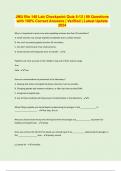Jmu bio 140 - Study guides, Class notes & Summaries
Looking for the best study guides, study notes and summaries about Jmu bio 140? On this page you'll find 195 study documents about Jmu bio 140.
Page 3 out of 195 results
Sort by
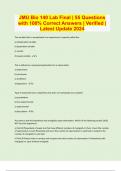
-
JMU Bio 140 Lab Final | 55 Questions with 100% Correct Answers | Verified | Latest Update 2024
- Exam (elaborations) • 11 pages • 2024
- Available in package deal
-
- $10.49
- + learn more
The variable that is manipulated in an experiment is typically called the: a) independent variable b) dependent variable c) control d) causal variable - a This is defined as a proposed explanation for an observation a) experiment b) conclusion c) prediction d) hypothesis - d Type of study that tests a hypothesis but does not manipulate any variables a) quantitative b) non-experimental c) experimental d) descriptive - b

-
JMU Bio 140 Lab Exam Questions and Answers 2023 | 100% Verified Answers
- Exam (elaborations) • 14 pages • 2023
- Available in package deal
-
- $8.99
- + learn more
JMU Bio 140 Lab Exam Questions and Answers 2023 | 100% Verified Answers JMU Bio 140 Lab Exam Questions and Answers 2023 | 100% Verified Answers
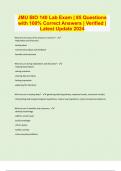
-
JMU BIO 140 Lab Exam | 85 Questions with 100% Correct Answers | Verified | Latest Update 2024
- Exam (elaborations) • 9 pages • 2024
- Available in package deal
-
- $8.49
- + learn more
What are the parts of the process of science? - -exploration and discovery -testing ideas -community analysis and feedback -benefits and outcomes What occurs during exploration and discovery? - -making observations -asking questions -sharing data and ideas -finding inspiration -exploring the literature What occurs in testing ideas? - -gathering data (hypothesis, expected results, and actual results) -Interpreting data (support/oppose hypothesis, inspire new hypothesis, inspire revi...
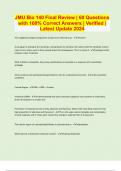
-
JMU Bio 140 Final Review | 60 Questions with 100% Correct Answers | Verified | Latest Update 2024
- Exam (elaborations) • 7 pages • 2024
- Available in package deal
-
- $7.99
- + learn more
The negatively charged components of atoms are referred to as - electrons A young girl is staring at the raindrops running down her window. She notices that the raindrops remain more or less intact, even as they cascade down the windowpane. This is a result of - hydrogen bonds between water molecules With 4 distinct nucleotides, how many combinations are possible in a sequence of 6 nucleotides - 4096 Amino acids can be spontaneously generated in vitro (in a laboratory), but only - under an...
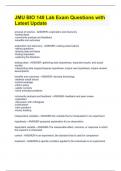
-
JMU BIO 140 Lab Exam Questions with Latest Update
- Exam (elaborations) • 12 pages • 2024
-
Available in package deal
-
- $14.49
- + learn more
process of science - ANSWER--exploration and discovery -testing ideas -community analysis and feedback -benefits and outcomes exploration and discovery - ANSWER--making observations -asking questions -sharing data and ideas -finding inspiration -exploring the literature testing ideas - ANSWER--gathering data (hypothesis, expected results, and actual results) -Interpreting data (support/oppose hypothesis, inspire new hypothesis, inspire revised assumptions) benefits and ou...
JMU BIO 140 Bundled Exams with Complete Solution | Verified | Guaranteed Success
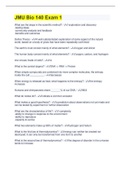
-
JMU Bio 140 Exam 1 | 186 Questions with 100% Correct Answers
- Exam (elaborations) • 11 pages • 2022
-
- $10.49
- 1x sold
- + learn more
What are the steps in the scientific method? - -exploration and discovery -testing ideas -community analysis and feedback -benefits and outcomes Define Theory - A well-substantiated explanation of some aspect of the natural world, based on a body of gives that have been repeatedly confirmed The earth's crust consist mainly of what elements? - oxygen and silicon The human body consist mainly of what elements? - oxygen, carbon, and hydrogen Are viruses made of cells? - no What is the cen...
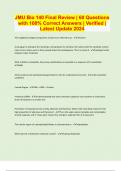
-
JMU Bio 140 Final Review | 60 Questions with 100% Correct Answers | Verified | Latest Update 2024
- Exam (elaborations) • 7 pages • 2023
-
- $10.49
- + learn more
The negatively charged components of atoms are referred to as - electrons A young girl is staring at the raindrops running down her window. She notices that the raindrops remain more or less intact, even as they cascade down the windowpane. This is a result of - hydrogen bonds between water molecules With 4 distinct nucleotides, how many combinations are possible in a sequence of 6 nucleotides - 4096 Amino acids can be spontaneously generated in vitro (in a laboratory), but only - under an...
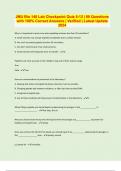
-
JMU Bio 140 Lab Checkpoint Quiz 5-12 | 60 Questions with 100% Correct Answers | Verified | Latest Update 2024
- Exam (elaborations) • 13 pages • 2023
-
- $15.49
- + learn more
Why is it important to post-rinse when pipetting volumes less than 20 microliters? A. Small volumes may not get expelled completely due to surface tension. B. You can't accurately pipette less than 20 microliters. C. You don't need to post rinse small volumes. D. Small volumes will evaporate prior to transfer. - A. Pipettors are most accurate in the middle to top end of their volume range. True False - True How can contamination be prevented in the laboratory? A. Keeping test tubes an...
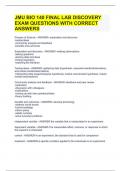
-
JMU BIO 140 FINAL LAB DISCOVERY EXAM QUESTIONS WITH CORRECT ANSWERS
- Exam (elaborations) • 8 pages • 2024
-
Available in package deal
-
- $11.49
- + learn more
Process of Science - ANSWER--exploration and discovery -testing ideas -community analysis and feedback -benefits and outcomes Exploration and discovery - ANSWER--making observations -asking questions -sharing data and ideas -finding inspiration -exploring the literature Testing ideas - ANSWER--gathering data (hypothesis, expected results/observations, and actual results/observations) -interpreting data (support/oppose hypothesis, inspire new/revised hypothesis, inspire revised as...

Study stress? For sellers on Stuvia, these are actually golden times. KA-CHING! Earn from your study resources too and start uploading now. Discover all about earning on Stuvia



